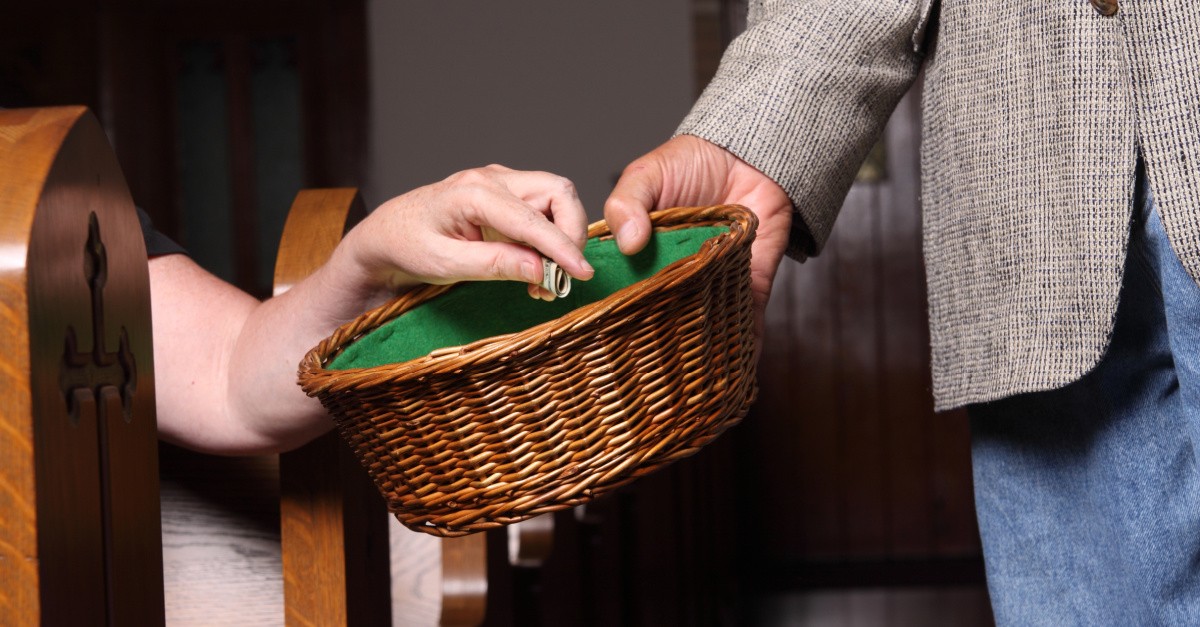How Do I Start Tithing When I Don’t Feel Ready?
Pastors / Leadership


Audio By Carbonatix
By Dr. Jeffrey Allen Love, Crosswalk.com
Dear Roger and Friends
I’m having a very difficult time financially. But I know that God has called us to tithe. I just don’t know where to start. Can you help me make a wise decision?
Sincerely, JoAnna
Hi JoAnna,
This is Jeff. I recently received the same heartfelt question. I believe it speaks to a tension many of us feel. Someone shared, “I want to start tithing, but I just don’t feel ready.” That single sentence is packed with so much honesty: a desire to honor God mixed with a very real fear of not having enough. If you’ve ever felt this way, please know you are not alone. It’s a struggle that pits our faith against our finances, and it’s a conversation worth having.
I’ve spent a lot of time thinking about this exact tension. In fact, it’s the core of a principle I live by: Open hands lead to an open heart. Whatever we are willing to open our hands to—sharing our time, our influence, our resources—we are also opening our hearts to. The reverse is also true. When we clench our fists around something, we inadvertently close our hearts. This journey of generosity, starting with the tithe, isn't just about money. It's about opening our hearts completely to God as our loving Father and provider.
So, let's walk through this feeling of “not being ready” together. What does it take to move from a place of fear to a place of faith-filled action?
Photo Credit: ©iStock/Getty Images Plus/doidam10

The Great Question: Security or Trust?
Not long ago, I was driving and passed a lottery billboard flashing a staggering number: $300 million. In that moment, I felt the Lord pose a question to me, “Would you rather have $300 million in cash or trust Me to provide for your needs?”
I confess, I paused. My mind immediately started doing the math. Three hundred million dollars could solve a lot of problems. It whispered promises of lifelong security, peace of mind, and the ability to do so much good. For a few brief moments, I found myself weighing the trade-off. It was a test. Would I trade God as my provider for a massive bank account? The thought horrified me, but the fact that I hesitated revealed something deep within me—a part of my heart that still wrestled with trusting God completely.
This is the core of our hesitation around tithing. Money promises security, peace, and provision. The problem is, as the Apostle Paul reminds us, money is “unreliable” (1 Timothy 6:17). It comes and goes. It can’t deliver on its biggest promises.
Only God can provide the true security our hearts long for. We cannot serve two masters. As Jesus said, “You will be devoted to one and despise the other. You cannot serve both God and money” (Matthew 6:24).
The decision to tithe is a powerful declaration of whether you will pursue the promise of financial security through money or the reality of God’s provision by trusting Him.
Photo Credit: ©iStock/Getty Images Plus/Stas_V

Overcoming Common Fears about Tithing
Feeling “not ready” usually comes down to a few common fears. Let's name them and bring them into the light.
- Fear #1: “I won't have enough left over.” This is the most common fear. We look at our bills, our budget, and our bank account, and the math just doesn't seem to work. We think, “If I give 10% away, I'll be short for rent, groceries, or gas.”
- Fear #2: “I have too much debt.” Many feel they need to pay off all their credit cards, student loans, or car payments before they can even think about tithing. The weight of debt makes generosity feel irresponsible.
- Fear #3: “My income is too irregular.” For freelancers, commission-based workers, or those in between jobs, an unpredictable income makes consistent giving feel impossible. How can you commit to a percentage when you don't know what you'll make next month?
These fears are valid and real. But they are rooted in the assumption that everything depends on our own efforts. The practice of tithing invites us into a different reality—one where God is our partner and provider.
Photo Credit: ©Getty Images/Princess dlaf

Close the “Holes” in Your Spending
A Note from Roger Barrier’s Teaching:
The prophet Haggai explained that one of the reasons money flows away from us is because we have a money bag with a hole in it:
Now this is what the Lord Almighty says: ‘Give careful thought to your ways. You have planted much, but harvested little. You eat, but never have enough. You drink, but never have your fill. You put on clothes, but are not warm. You earn wages, only to put them in a purse with holes in it’’” (Haggai 1:5-6).
Our wallets and pocketbooks today are the same as money bags in Haggai’s time. When we ask God for financial blessing, our focus is typically on God pouring more in the top. “If I just had $150 more a month, everything would be so much better.”
What if God looked in our money bag and saw a hole. Would it make sense for Him to keep shoveling more in the top?
I have had occasion to counsel with individuals who earn relatively high incomes. In spite of their substantial cash flow, they were having financial difficulty. The remarks they made were familiar: “I don’t know where it all went”; “I don’t have much to show for it”; etc. They often had a debt problem as well. Such stories illustrate that money can flow from us, even if the income is large.
Closing the holes in your finances is a very difficult task, but until you know exactly what you have to spend—where every single dollar goes—you can’t make wise financial decisions. It’s that simple. Take the time to find and track your money.
A Note from Brie Barrier Wetherbee:
I find that several apps are helpful for “closing the holes.” Try Rocket Money, YNAB, or Quicken Simplifi. You’ll be able to track every transaction, create a budget, and watch what you’re spending on a day-to-day basis.
Photo Credit: ©GettyImages/fizkes

How to Grow in Trust and Start Tithing
Trust isn’t a switch you flip; it’s a muscle you build. If you want to start tithing but feel stuck, here are three practical ways to begin growing in trust and take that first step.
1. Recognize the Difference Between Wants and Needs
The first step is a mindset shift. God promises to provide for all our needs. As Philippians 4:19 says, “And this same God who takes care of me will supply all your needs from his glorious riches, which have been given to us in Christ Jesus.” Notice it says “needs,” not “wants.”
As a father of four, I understand this distinction. I love giving my children good gifts, but I love them too much to give them something that could harm them. Our Heavenly Father operates with infinitely more wisdom and love. He knows what we truly need for our well-being and character, and sometimes His answer to our wants is “No” or “Wait.”
Prayerfully sit down with your budget. As you look at your expenses, ask God to give you clarity. What are your genuine needs? What are the wants that might be masquerading as needs? This isn't about feeling guilty for wanting nice things. It’s about reorienting your heart to trust that God’s provision for your needs is absolute and certain.
2. Remember that Tithing Is an Act of Worship
When you open your hands to give, you are doing more than moving money. You are performing an act of worship. You are acknowledging that God is the source of everything you have. You're saying, “God, it all belongs to You. I trust You with every part of my life.”
Jesus taught, “Wherever your treasure is, there the desires of your heart will also be” (Matthew 6:21). This is a crucial spiritual principle. Your heart follows your treasure. When you intentionally direct the first portion of your treasure toward God, you are training your heart to follow Him.
Conversely, whatever you cling to with a closed fist becomes an area where you withhold worship. It creates a barrier in your relationship with your Father. Tithing dismantles that barrier. It's a weekly or monthly rhythm that keeps your heart soft and open toward Him.
3. Return a Portion to God (Starting Where You Are)
So, how do you practically start? You don’t have to wait until you “feel” ready or until your financial situation is perfect. You can start today, right where you are. Jesus praised faithfulness in small things, saying, “If you are faithful in little things, you will be faithful in large ones” (Luke 16:10). God is looking at your heart, not just the amount.
Here’s a simple, step-by-step plan to begin:
- Commit to a Percentage. If 10% feels too overwhelming right now, don't let that stop you. Start with a percentage that feels like a step of faith—maybe it’s 3%, 5%, or 7%. The important thing is to start. You can commit to increasing that percentage over time as your trust grows.
- Give First, Not Last. This is key. Don't wait to see what's left at the end of the month. Make your gift to God the very first "bill" you pay when you receive income. This tangible act demonstrates that He is your first priority.
- Automate Your Giving. Most churches offer online giving. Set up a recurring gift. This removes the “should I or shouldn't I” debate from your mind each time you get paid. It makes giving a consistent, disciplined act of worship rather than an emotional decision.
- Trust God with the Rest. After you've given your committed portion, trust God to make the remaining 90-something percent stretch further than 100% would have on your own. This is the faith part of the equation, and it’s where you’ll see Him show up in amazing ways.
An Invitation to Open Your Hands
I often picture myself reaching for a few of my kids’ French fries. It brings me so much joy when they willingly offer them, trusting that I, their dad, will make sure they have all they need. In the same way, our Heavenly Father delights when we open our hands and offer Him the first portion, trusting that He is the Lord of everything and He has our best interests at heart.
JoAnna, if you’re standing on the edge, wanting to tithe but feeling afraid, I want to invite you to take one small step of faith this week. Don't wait for the fear to disappear. Act in spite of it. Decide on a starting percentage, schedule that first gift, and watch what God does. Open your hands, and you will find your heart opening, too.
You’ve got this.
Sincerely, Jeff
Photo Credit: ©GettyImages/Enterline Design Services LLC

























